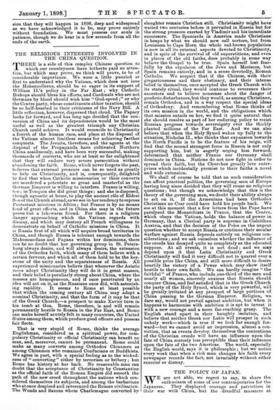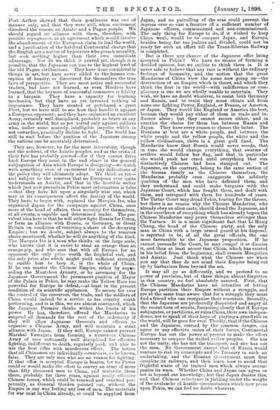THE POLICY OF JAPAN.
WE are not able, we regret to say, to share the enthusiasm of some of our contemporaries for the Japanese. They displayed courage and patriotism in their war with China, but the dreadful massacre at Port Arthur showed that their gentleness was one of manner only, and that they were still, when excitement dissolved the veneer, an Asiatic and a Pagan people. We should regard an alliance with them, therefore, with positive repugnance, as an agreement which would involve the abandonment of the European claim to lead the world, and a justification of the habitual Continental charge that the English are a nation of hypocrites who preach morality, but seek nothing higher than their own immediate -advantage. Nor do we think it proved yet, though it is possible, that the Japanese can rise to the highest level of the old Pagan civilisations. They have done considerable things in art, but have never added to the human con- ception of beauty, or discovered for themselves the true laws of perspective. They are most active and successful traders, but have not learned, as even Hind.00s have learned, that the keynote of successful commerce is fidelity to a bargain. They have a capacity for learning mechanics, but they have as yet invented nothing of importance. They have created or purchased a great Fleet, but we have still to see how they handle it against a European opponent; and they have organised an excellent Army, certainly well disciplined, probably as brave as any army in the world, but as yet tested only against soldiers who, under some scarcely intelligible impulse which is not cowardice, practically decline to fight. The world has still to wait before the position of the Japanese among the nations can be accurately determined.
They are, however, by far the most interesting, though not the noblest, of the Asiatic peoples, and as the crisis of their fate has probably arrived—for if they cannot drive back Europe they must in the end share in the general subjugation of Asia which Europe is designing—we watch With something even of excitement for any indications of the policy they will ultimately adopt. We think as yet— and subject to the reserves that no European ever quite understands an Asiatic, and that. in the horrible welter which just now prevails in Pekin most information is false —that they have hit upon a singularly wise one, which may in its consequences affect the destiny of the world. They have, to begin with, replaced the Marquis Ito, who organised Japan for the campaign against China, once more at the head of affairs, thus securing for themselves, at all events, a capable and determined leader. The pre- valent idea here is that he will either fight Russia for Corea, or form an alliance with Russia, or Germany, or Great Britain on condition of receiving a share of the decaying Empire ; but we doubt, subject always to the reserves above-mentioned, whether he will do anything of the kind. The Marquis Ito is a man who thinks on the large scale, who knows that it is easier to steal an orange than an orange-pip, and who sees that with all Europe for an opponent the only prize worth the frightful risk, and. the only prize also which might yield sufficient strength to enable him to keep it, is the whole of China. If he can master the Chinese Empire, either by super- seding the Mantchou dynasty, or by assuming for the Japanese Government the permanent position of Mayor of the Palace in Pekin, he may make the Yellow Race too powerful for Europe to defeat,—at least in the present eondition of its scientific appliances. To secure for ever the control of the resources, the trade, and the soldiers of China would indeed be a service to his country worth performing, and. it is this, we are almost convinced, which the Japanese Premier thinks within the limits of his power. He has, therefore, offered the Mandarins to suspend all demands for the rest of the indemnity if they will allow Japanese Generals and. officers to organise a Chinese Army, and will maintain a strict alliance with Japan. If they will, Europe cannot prevent Marshal Yamagata from forming a numerous Chinese Army of men sufficiently well disciplined for effective fighting, indifferent to death, regularly paid, and able to use the best rifles with murderous effect. The notion that all Chinamen are individually cowards is, as he knows, false. They are only men who see no reason for fighting. If that offer is accepted Europe is beaten, for no Power could or would make the effort to convey an army of more than fifty thousand men to China, and maintain them there, probably for three years, against really effective Chinese forces, which could be renewed and renewed per- petually, as General Gordon pointed out, without the Empire in any way feeling any loss of men. The materials for war exist in China already, or could be supplied from Japan, and no patrolling of the seas could prevent the ingress over so vast a frontier of a sufficient number of Japanese officers, commissioned. and non-commissioned. The only thing for Europe to do, if it wished to keep China weak, would be to conquer Japan, and Europe, besides being far too jealous and divided, could not be ready for such an effort till the Trans-Siberian Railway is completed. But is there any- chance of the Japanese offer being accepted in Pekin ? We have no means of forming a, decided opinion, but we incline to think there is. It is never safe to believe that any race is without the ordinary feelings of humanity, and. the notion that the great Mandarins of China view the scene now going on—the destruction of an Empire which is theirs, and which they think the first in the world—with indifference or com- placency is one we are wholly unable to entertain. They wish, we have no doubt whatever, to resist both Germany and Russia, and to resist they must obtain aid from some one fighting Power, England, or France, or America, or Japan. They would like England or America the best, because they would pay either of them in trade and in- fluence alone ; but they cannot secure either, and in practice the choice for them lies between Russia and Japan. They have every reason to choose the latter. The Russians at best are a white people, and between the white people and the yellow people, the white and the yellow civilisations, there is a great gulf fixed. The Mandarins know that Russia would. never recede, that in time she would change everything, that swarms of settlers would follow her flag, and that in particular she would push her creed until everything that was distinctively Chinese had been stamped out. The Japanese, on the contrary, belong to the same section of the human family as the Chinese themselves, the Mandarins probably even exaggerate the soldierly qualities of the men who have defeated them, and they understand and could. make bargains with the Japanese Court, which has fought them, and dealt with them, and intrigued with them for hundreds of years. The Tartar Court may dread Tokio, fearing for the throne, but there is no reason why the Chinese Mandarins, who already obey an alien caste, should dread the Japanese, and. in the overthrow of everything which has already begun the Chinese Mandarins may prove themselves stronger than the Tartars. It is a most significant fact that Li Hung Chang, the head of the Chinese party, and the only man in China with a large armed guard at his disposal, is reported to be, of all the great officials, the one most favourable to the Japanese proposition. If he cannot persuade the Court, he may compel it or dismiss it, and thus at least secure that China, which has existed in his belief from the beginning, shall remain Mongolian and Asiatic. Just think what the Chinese are when you say that they do not mind their Empire being cut up by barbarians from beyond the sea.
It may all go so differently, and we pretend to no power of prevision, but of three things, almost forgotten in this country, we feel absolutely assured. First, that the Chinese Mandarins have no intention of letting Europe partition their Empire without a struggle, and are at the same time aware that for a struggle they must find a friend who can reorganise their resources. Secondly, that the Japanese are profoundly disquieted and angry at the recent turn of events, foreseeing clearly that if Europe subjugates, or partitions, or rules China, their own indepen- dence, not to speak of their hope of playing a grand role in the world, will be gone for ever. Thirdly, that if the Chinese and. the Japanese, coerced by the common danger, can agree to any effective union of their forces, Continental Europe has not the power at present to make the effort necessary to conquer the united yellow peoples. She has not the unity, she has not the transport, and she has not the men. No Government except that of Russia would venture to risk its conscripts and its Treasury in such an undertaking, and the Russian Government must first complete its railways, and then learn how to avoid that frightful waste of its trained men which always accom- panies its wars. Whether China and Japan can agree or not is beyond our knowledge ; but that Japan desires this, and that Chinese reluctance is yielding under the weight of the avalanche of hostile circumstances which now press upon Pekin, we can feel no doubt whatever.











































 Previous page
Previous page